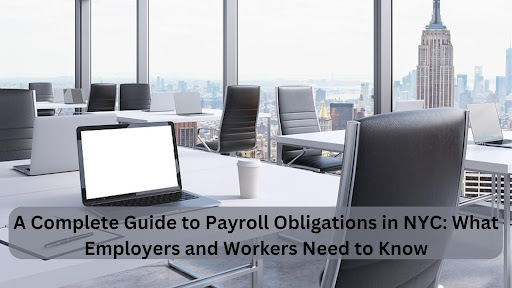Negotiation for payroll processes in the city of New York is both tiresome and cumbersome for both the employer and the employee given the fact that the prevailing laws make payroll process complicated.The goal of this guide is to clarify employee classification issues, wage laws, tax deductions, and filing obligations while adhering to both local and federal laws. Businesses using modern payroll software will help navigate New York’s regulations effectively to stay compliant and create an open workplace culture while remaining transparent and equitable for both staff members and employers.
Overview of Payroll Obligations
New York City employers must fulfill various responsibilities regarding payroll under local, state, and federal regulations. These tasks range from accurate classification of employee classification and wage/hour compliance through tax withholding/reporting procedures as well as providing mandated benefits to their workforces. Both employees and employers need an understanding of these regulations for smooth payroll operations to occur without legal complications arising – helping foster an equitable work environment in NYC.
Understanding Employee Classification
Accurate employee classification is key for complying with NYC labor laws and financial liabilities, and misclassifying can result in legal fines or liabilities for misclassification of full-time, part-time, and independent contractors with different tax obligations and entitlements. Employers should distinguish among full-time, part-time, and independent contractor employees to meet tax responsibilities as required under labor law obligations – this ensures fair workplace conditions while upholding compliance.
Wage and Hour Laws in NYC
Wage and hour laws in New York City are designed to shield employees by ensuring the proportionate remuneration; New York City’s wages are higher than federal minimum to consider the cost of living in the city. Employers are supposed to adhere to the wage laws and risk sanctions; proper time records aid in determining employee’s wages in relation to legal requirements.
Overtime regulations form an integral component of NYC payroll tax obligations, mandating that employees receive 1.5x their regular pay rate for any hours worked beyond 40 in any week. Familiarizing yourself with wage and hour laws is vital in remaining compliant, creating fair working environments, and avoiding legal complications related to payroll taxes in New York City.
Payroll Taxes and Deductions
Employing in New York involves withholding payroll taxes and deductions at every level – federal, state, and local. Employers in NYC must withhold income taxes, Social Security contributions, and Medicare contributions from employees’ paychecks before contributing their share to meet federal, state, and local obligations; accurate calculation and timely remittance are critical to avoid penalties associated with breaching this duty.
Deductions may include unemployment insurance and disability benefit payments as well as NYC payroll taxes where applicable. Employers may manage voluntary deductions such as health and retirement plans in addition to legal deductions from paychecks; keeping abreast of these requirements helps ensure compliance, accurate payroll processing, and open communication between employer and employees.
Employee Benefits and Payroll
Employee benefits significantly impact payroll processing, encompassing mandatory and optional benefits. In NYC, employers must provide Social Security, Medicare, and unemployment insurance, influencing payroll calculations. Employees are satisfied and retained through effective benefit management that adheres to legal standards.
Optional benefits, such as health insurance and retirement plans, add complexity to payroll processing. Employers must handle deductions correctly to avoid errors. It is therefore important to deal with these benefits appropriately, in compliance with the legal requirements so as to improve morale of the employees and their level of commitment to their work.
NYC-Specific Payroll Regulations

Employers in NYC face additional complications due to local payroll regulations that must be observed, including adhering to unique legislation such as:
Commuter Benefits Law: Employers with 20 or more full-time employees must offer pre-tax transit benefits as a precondition for hiring these staffers.
Temporary Schedule Change Law: Employees may request temporary schedule changes due to personal events and bezahlt Sick Leave Law: Employers are obliged to offer paid sick leave based on company size and employee hours worked.
Legal compliance and smooth payroll operations in NYC depend on our understanding and observing all relevant laws.
Common Payroll Pitfalls and How to Avoid Them
Some mistakes organizations should avoid making when processing payroll include; Sometimes employees are misclassified and this attracts fines and penalties. Minimizing taxes is a common reason employers use the incorrect legal classification of workers as independent contractors. Accurate classification is crucial to compliance. Regularly reviewing job roles and consulting legal guidelines can help prevent these costly errors.
Incorrect wage calculations are another frequent issue, often stemming from overtime mismanagement or failure to update tax rates. To avoid this, employers should use reliable payroll software and stay informed about wage and tax law changes. Consistent audits and training for payroll staff ensure accurate payroll processing, minimizing the risk of legal disputes and fines.
Conclusion
Understanding payroll obligations in NYC is paramount for both employees and employers to achieve legal compliance, create fair working environments, and avoid common pitfalls or legal issues. Employing payroll software provides for an efficient process while keeping abreast of regulations can promote transparency within an organization resulting in positive business practices for everyone involved.
Keep an eye for more news & updates on Essential Tribune!








